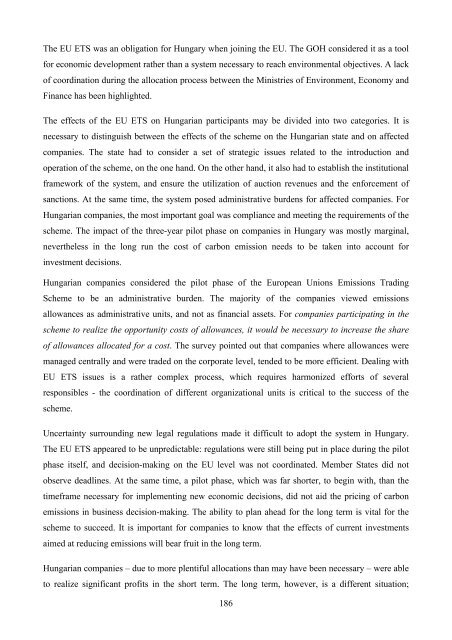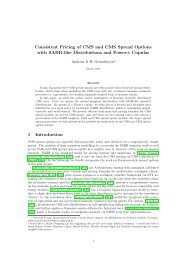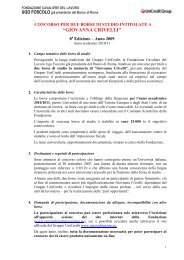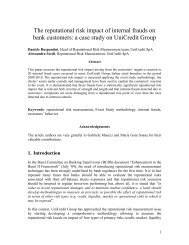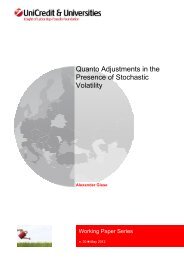Dóra Fazekas Carbon Market Implications for new EU - UniCredit ...
Dóra Fazekas Carbon Market Implications for new EU - UniCredit ...
Dóra Fazekas Carbon Market Implications for new EU - UniCredit ...
Create successful ePaper yourself
Turn your PDF publications into a flip-book with our unique Google optimized e-Paper software.
The <strong>EU</strong> ETS was an obligation <strong>for</strong> Hungary when joining the <strong>EU</strong>. The GOH considered it as a tool<br />
<strong>for</strong> economic development rather than a system necessary to reach environmental objectives. A lack<br />
of coordination during the allocation process between the Ministries of Environment, Economy and<br />
Finance has been highlighted.<br />
The effects of the <strong>EU</strong> ETS on Hungarian participants may be divided into two categories. It is<br />
necessary to distinguish between the effects of the scheme on the Hungarian state and on affected<br />
companies. The state had to consider a set of strategic issues related to the introduction and<br />
operation of the scheme, on the one hand. On the other hand, it also had to establish the institutional<br />
framework of the system, and ensure the utilization of auction revenues and the en<strong>for</strong>cement of<br />
sanctions. At the same time, the system posed administrative burdens <strong>for</strong> affected companies. For<br />
Hungarian companies, the most important goal was compliance and meeting the requirements of the<br />
scheme. The impact of the three-year pilot phase on companies in Hungary was mostly marginal,<br />
nevertheless in the long run the cost of carbon emission needs to be taken into account <strong>for</strong><br />
investment decisions.<br />
Hungarian companies considered the pilot phase of the European Unions Emissions Trading<br />
Scheme to be an administrative burden. The majority of the companies viewed emissions<br />
allowances as administrative units, and not as financial assets. For companies participating in the<br />
scheme to realize the opportunity costs of allowances, it would be necessary to increase the share<br />
of allowances allocated <strong>for</strong> a cost. The survey pointed out that companies where allowances were<br />
managed centrally and were traded on the corporate level, tended to be more efficient. Dealing with<br />
<strong>EU</strong> ETS issues is a rather complex process, which requires harmonized ef<strong>for</strong>ts of several<br />
responsibles - the coordination of different organizational units is critical to the success of the<br />
scheme.<br />
Uncertainty surrounding <strong>new</strong> legal regulations made it difficult to adopt the system in Hungary.<br />
The <strong>EU</strong> ETS appeared to be unpredictable: regulations were still being put in place during the pilot<br />
phase itself, and decision-making on the <strong>EU</strong> level was not coordinated. Member States did not<br />
observe deadlines. At the same time, a pilot phase, which was far shorter, to begin with, than the<br />
timeframe necessary <strong>for</strong> implementing <strong>new</strong> economic decisions, did not aid the pricing of carbon<br />
emissions in business decision-making. The ability to plan ahead <strong>for</strong> the long term is vital <strong>for</strong> the<br />
scheme to succeed. It is important <strong>for</strong> companies to know that the effects of current investments<br />
aimed at reducing emissions will bear fruit in the long term.<br />
Hungarian companies – due to more plentiful allocations than may have been necessary – were able<br />
to realize significant profits in the short term. The long term, however, is a different situation;<br />
186


